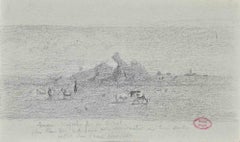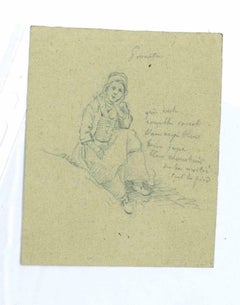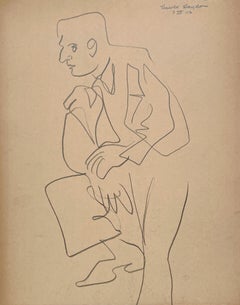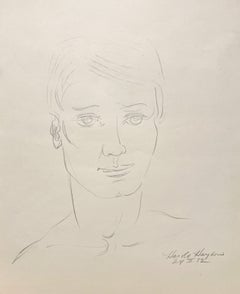Paul Huet Figurative Drawings and Watercolors
to
2
Overall Width
to
Overall Height
to
2
2
1
1
1
1
1
1
1
1
2
5
883
324
192
177
Artist: Paul Huet
Landscape - Drawing by Paul Huet - 19th Century
By Paul Huet
Located in Roma, IT
Landscape is a Pencil Drawing realized by Paul Huet.
Good condition included a grey cardboard passpartout (32.5x50 cm).
Stamp signed on the lower right corner.
Paul Huet (3 October 1803 – 8 January 1869) was a French painter and printmaker born in Paris. He studied under Gros and Guerin. He met the English painter Richard Parkes Bonington in the studio of Gros, where he studied irregularly from 1819 to 1822. Bonington's example influenced Huet to reject neoclassicism and instead paint landscapes based on close observation of nature. The British landscape paintings exhibited in the Salon of 1824 were a revelation to Huet, who said of Constable's work: "It was the first time perhaps that one felt the freshness, that one saw a luxuriant, verdant nature, without blackness, crudity or mannerism."[4] Huet's subsequent work combined emulation of the English style with inspiration derived from Dutch and Flemish old masters such as Rubens, Jacob van Ruisdael...
Category
19th Century Modern Paul Huet Figurative Drawings and Watercolors
Materials
Pencil
The Maiden - Original Drawing by Paul Huet - 19th Century
By Paul Huet
Located in Roma, IT
The Maiden is an original Drawing in pencil realized in the 19th Century by Paul Huet (1803-1869).
With another drawing on the rear.
In good condition.
The artwork is depicted sk...
Category
19th Century Modern Paul Huet Figurative Drawings and Watercolors
Materials
Pencil
Related Items
A Handsome 1940s Portrait of a Seated Man by Chicago Artist, Harold Haydon
By Harold Haydon
Located in Chicago, IL
A Handsome 1940s Portrait of a Seated Man by Chicago Modern Artist, Harold Haydon (Am. 1909-1994). A wonderfully executed line drawing dating from 1946 with great character; looks ...
Category
Mid-20th Century American Modern Paul Huet Figurative Drawings and Watercolors
Materials
Paper, Graphite
$135
H 20 in W 16 in D 0.13 in
A Sensitive 1950s Mid-Century Modern Portrait of a Young Man By Harold Haydon
By Harold Haydon
Located in Chicago, IL
A Sensitive, Finely Rendered 1950s Mid-Century Modern Portrait of a Young Man By Noted Chicago Artist, Harold Haydon (Am. 1909-1994). Artwork size: 12 x 9 1/2 inches. Artwork is un...
Category
Mid-20th Century American Modern Paul Huet Figurative Drawings and Watercolors
Materials
Paper, Graphite
$385
H 16 in W 12 in D 0.13 in
"Arquebusiers En Manoeuvre", After Marchetti
Located in Soquel, CA
Figurative landscape of four infantrymen in formation with their long arquebus guns by Adolphe Ancker (Dutch, 19th Century), after Marchetti. Signed and dated "Adolph Ancker 1888" lo...
Category
1880s American Impressionist Paul Huet Figurative Drawings and Watercolors
Materials
Watercolor, Pencil, Paper
French School 19th Century, A Muskeeter, original pencil drawing
Located in Paris, FR
French school 19th Century
A Muskeeter
Pencil on paper
26.5 x 17 cm
Bears a signature "F. Roybet" in the lower right
In quite good condition, bears some visible foxings,
In an old mount (some damages)
(not framed)
Even if the style, execution and of course subject are those of Ferdinand Roybet...
Category
1890s Academic Paul Huet Figurative Drawings and Watercolors
Materials
Carbon Pencil
Children Snow Sledding in Central Park - New Yorker Cover Study
Located in Miami, FL
Hungarian/American artist/illustrator depicts a charming scene of sledding in the snow in Central Park. The work is abstract in its design as it's functional in its narrative - Unpublished New Yorker...
Category
1940s Modern Paul Huet Figurative Drawings and Watercolors
Materials
Charcoal, Ink, Watercolor, Gouache, Pencil
$15,000
H 16.85 in W 12.25 in
"Contemplation"
By Gershon Benjamin
Located in Lambertville, NJ
Jim’s of Lambertville is proud to offer this artwork by:
Gershon Benjamin (1899-1985)
An American Modernist of portraits, landscapes, still lives, and the urban scene, Gershon Benj...
Category
1920s Modern Paul Huet Figurative Drawings and Watercolors
Materials
Graphite
The Endeavour.
By Arthur John Trevor Briscoe
Located in Storrs, CT
The Endeavour. c.1935. Pencil and watercolor on watercolor board. 14 3/8 x 20 7/8. Signed in pencil, lower right; titled in pencil, verso. Housed in a subtle 23 1/2 x 36-inch light ...
Category
1930s Modern Paul Huet Figurative Drawings and Watercolors
Materials
Pencil, Watercolor
Young man in a toga elegant man Latin American hyperrealist Hockney style
By Claudio Bravo
Located in Norwich, GB
Superb original drawing in coloured conté pencils, heightened with white on oatmeal coloured vergé paper by Claudio Bravo. The work was created during the artist's Moroccan period, a...
Category
1970s Modern Paul Huet Figurative Drawings and Watercolors
Materials
Conté, Laid Paper, Color Pencil
$7,500
H 30.32 in W 24.02 in D 0.4 in
Chapel and houses along a lake, New England Landscape - American School, 19th C
Located in Middletown, NY
Watercolor and pencil on buff wove watercolor paper, 10 x 8 inches (255 x 203 mm). In good condition with overall minor toning. Some watercolor paint splatters on the verso, contem...
Category
Early 1900s American Modern Paul Huet Figurative Drawings and Watercolors
Materials
Watercolor, Pencil
Félix Ziem (1821-1911) Studies of Landscapes and Seascapes, original Drawing
By Félix Ziem
Located in Paris, FR
Félix Ziem (1821-1911)
Studies of landscapes and seascapes
graphite on paper,
14 x 22 cm
Stamp of the Ziem Estate bottom left
Framed : 25 x 33 cm
A rare exemple of mutiple studies ...
Category
1880s Romantic Paul Huet Figurative Drawings and Watercolors
Materials
Graphite
$1,495
H 5.52 in W 8.67 in
1940s Charcoal and Pencil Portrait of a Man
Located in Arp, TX
Artist Unknown
"Tie and Glasses"
c. 1940s
Charcoal and pencil on paper
13.5"x17" site 19"x23" rustic wood frame
Unsigned
Category
1940s Modern Paul Huet Figurative Drawings and Watercolors
Materials
Paper, Charcoal, Carbon Pencil
Two figures amongst some ruins – English School 19th Century
Located in Middletown, NY
Pen and ink and watercolor on mid-weight, cream wove paper, 8 3/4 x 12 1/4 inches (222 x 312 mm). Scattered light wear along the sheet perimeter, as well as a dog-eared lower right c...
Category
Late 19th Century English School Paul Huet Figurative Drawings and Watercolors
Materials
Handmade Paper, Pencil
Paul Huet figurative drawings and watercolors for sale on 1stDibs.
Find a wide variety of authentic Paul Huet figurative drawings and watercolors available for sale on 1stDibs. You can also browse by medium to find art by Paul Huet in pencil and more. Much of the original work by this artist or collective was created during the 19th century and is mostly associated with the modern style. Not every interior allows for large Paul Huet figurative drawings and watercolors, so small editions measuring 4 inches across are available. Customers who are interested in this artist might also find the work of Alfred Grevin, Eugène Giraud, and Georges Gobo. Paul Huet figurative drawings and watercolors prices can differ depending upon medium, time period and other attributes. On 1stDibs, the price for these items starts at $77 and tops out at $339, while the average work can sell for $208.



